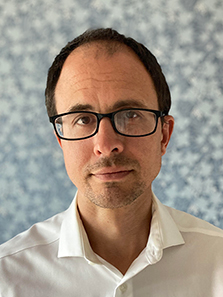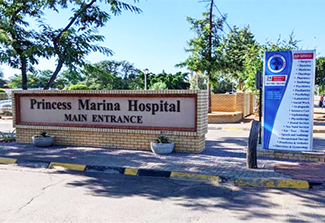Studying the intersection of HIV and breast cancer in Botswana
November/December 2024 | Volume 23 Number 6

When Dr. Arthur Johnson began his research on breast cancer treatment among HIV-positive women in Botswana, he anticipated challenges. But the reality of the barriers these patients face was eye-opening to him. “It was amazing how many women wanted to take the medication,” he said. “The problem was they couldn’t always afford it or find it. They want to follow the doctor’s recommendations, but other limitations hold them back.”
Currently based in Sweden, Dr. Johnson works as a general surgeon at Kalmar Region Hospital. His path to global health research was unique and even included a four-year stint in the United States Navy. Johnson joined the military through the Health Professions Scholarship Program (HPSP), which provides funding for medical school in exchange for service. His role as a Navy surgeon included a year on an aircraft carrier, and later, a deployment to northern Iraq during the COVID-19 pandemic, where he served through the end of 2021. Reflecting on his time in the Navy, Johnson said it instilled in him a strong sense of resilience and adaptability—qualities that truly prepared him for his Fogarty project.
Johnson studied in Botswana as a Fogarty Fellow through the INSIGHT program in 2023. In part, his project, “Impact of HIV on outcomes in women with breast cancer receiving tamoxifen in Botswana,” focused on adherence to tamoxifen, a common breast cancer drug, among women with HIV. (Tamoxifen blocks estrogen activity in the breast.) In the U.S. and Europe, adherence has often suffered due to patient side effects, such as hot flashes, weight gain, and edema (fluid retention), but Johnson was surprised to find a strong willingness among the women in Botswana to follow prescribed regimens despite the difficulties.
As a Fogarty fellow, Johnson's affiliation with INSIGHT--a consortium between The University of Maryland, the University of Alabama at Birmingham, Baylor College of Medicine, and the University of Pittsburgh--did not prevent him from also collaborating with the Botswana-Harvard Partnership. He mined their repository of HIV data, one of the largest in the region, to investigate survival outcomes among HIV-positive women receiving tamoxifen for breast cancer. He also analyzed data from a longitudinal database on patients living with HIV and cancer in Botswana to better understand whether tamoxifen use affected survival rates.
"Women living with HIV diagnosed with estrogen-receptor positive breast cancer are at increased risk of dying compared with HIV-negative women. The reasons for this are unknown," explained Johnson. What has been documented, though, is that efavirenz, an antiretroviral therapy (ART) for HIV often used in sub-Saharan Africa, interacts with estrogen. So Johnson and his colleagues decided to explore the effect of this ART on estrogen-receptor positive breast cancer survival.
While his initial project plans included conducting patient interviews and collecting blood samples, he had to pivot after encountering regulatory delays and logistical obstacles. “I initially envisioned interviewing patients and taking blood samples, but once there, I realized I had to scale back,” he said. “You make plans and then realize, ‘Well, that’s not practical.’”
 Photo courtesy of Arthur JohnsonJohnson worked at the Princess Marina Hospital in Botswana
Photo courtesy of Arthur JohnsonJohnson worked at the Princess Marina Hospital in Botswana
Johnson ultimately found that tamoxifen did not appear to have a significant impact on the survival rates of HIV-positive women with breast cancer. Given his small sample size (due to limited resources), this is considered an “inconclusive” finding and so underscores a key challenge for those working with less than optimal resources: a “conclusive” conclusion, if applied, could drive real improvements in patient care.
During his time in Botswana, Johnson recognized the importance of local mentorship. While he received support from mentors at Baylor University, it was the guidance of those on the ground that proved invaluable. “Your mentor on the ground is your most valuable resource,” he said. “The plans I made with mentors from afar sometimes didn’t align with the realities in Botswana, which my local mentors helped me navigate day-to-day.”
In Sweden now, Johnson is working to integrate global health research into his clinical career while pursuing his PhD. Although Sweden has fewer resources allocated for global health initiatives than the U.S., he remains determined to continue his work. “I’ve got a few lingering projects in Botswana,” he shared, “and I hope to keep exploring new ways to improve outcomes for patients in low-resource settings.”
More information
Updated November 27, 2024
To view Adobe PDF files,
download current, free accessible plug-ins from Adobe's website.
Related Fogarty Programs
Related World Regions / Countries
Related Global Health Research Topics